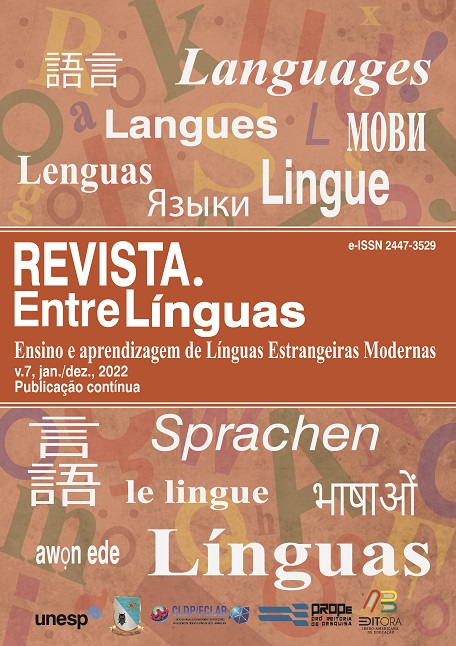Portuguese, an acentric language
Reflections from a teaching Portuguese as a Foreign Language in China perspective
DOI:
https://doi.org/10.29051/el.v8i00.15412Keywords:
Portuguese, Acentric Language, Plurinormative, Portuguese as a Foreign Language, ChinaAbstract
This article promotes an essayistic reflection on the Portuguese language, its spaces, changes, and (in)definitions based on perspectives arising from the experience of teaching Portuguese as a Foreign Language (PLE) in China over a decade. In this context, we criticize the concept of pluricentric language for making the diversity or decentralization of the Portuguese language depend on the imperatives of linguistic norms, extending a normative, polarized, and, essentially, a bicentric perspective of the Portuguese language. In this article, we defend the readjustment of the concept of pluricentric language to plurinormative language (because its scope is not in spaces or diversity, but the political-linguistic standardization of the Portuguese language) and we promote the concept of Portuguese as an acentric language, made of multiple and interconnected cultures, identities, and references.
Downloads
References
BATOREO, H. J. Que gramática(s) temos para estudar o Português língua pluricêntrica? Revista Diadorim, Rio de Janeiro, v. 16, p. 1-15, 2014. Disponível em: https://revistas.ufrj.br/index.php/diadorim/article/view/4023. Acesso em: 10 abr. 2021.
BATOREO, H. J.; SILVA, A. S. Estudar o português como língua pluricêntrica no enquadramento da Linguística Cognitiva com foco nas variedades nacionais do PE e PB. In: TEIXEIRA E SILVA et al. (org.). III SIMELP: A formação de novas gerações de falantes de português no mundo. China, Macau: Universidade de Macau, 2012.
BLANCHET, P. Introduction à la complexité de l'enseignement du français langue étrangère. Leuven: Peeters Publishers, 1998.
COUTO, M. Países africanos lusófonos relacionam-se num “triângulo tipicamente colonial”. Entrevista cedidada a Lusa. Jornal Público, 10 fev. 2018. Disponível em: https://www.publico.pt/2018/02/10/culturaipsilon/noticia/paises-africanos-lusofonos-relacionamse-num-triangulo-tipicamente-colonial-diz-mia-couto-1802715. Acesso em: 22 abr. 2021.
COUTO; M. Entrevista Mia Couto. Entrevista cedida a Gil Felipe. Revista Bula, 08 dez. 2008. Disponível em: https://acervo.revistabula.com/posts/entrevistas/entrevista-mia-couto. Acesso em: 19 abr. 2021.
CLYNE, M. (ed.). Pluricentric Languages. Differing norms in different nations. Berlin, New York: Mouton de Gruyter, 1992.
DUARTE, I. Português, língua pluricêntrica: Que português ensinar em aulas de língua estrangeira? In: ANDRADE, C.; MICHELETTI, G; SEARA, I. (org.). Memória, Discurso e Tecnologia. São Paulo: Terracota editora, 2016.
FRANCIS, N. Language and dialect in China. Chinese Language and Discourse, v. 7, n. 1, p. 136-149, 2016. Disponível em: https://www.jbe-platform.com/content/journals/10.1075/cld.7.1.05fra. Acesso em: 15 mar. 2021.
HERRERO, M. A. Etnocentrismo lingüístico vs. Plurinormativismo. Consideraciones sobre la variación y variedad del español LE/L2. In: MAESTU, E.; ANDREVA, F.; LÓPEZ, M. (eds.). Panhispanismo y variedades en la enseñanza del español L2-LE. ASELE: España, 2017, p. 131-140.
HERRERO, M. A. Del lectocentrismo al plurinormativismo. Reflexiones sobre la variedad del español como lengua segunda o extranjera. Estudios Filológicos, n. 64, p. 129-148, 2019. Disponível em: https://dialnet.unirioja.es/servlet/articulo?codigo=7755412. Acesso em: 10 jan. 2021.
HU, K. The Cantonese Linguicide: A Study of Prospective Language Death in Hong Kong. International Journal of Culture and History, v. 3, n. 2, p. 134-141, 2017. Disponível em: http://www.ijch.net/vol3/090-LM0025.pdf. Acesso em: 17 mar. 2021.
JATOBÁ, J. R. Política e Planejamento Linguístico na China: Promoção e Ensino da Língua Portuguesa. 2020. Tese (Doutorado em Português Língua Estrangeira) – Faculdade de Artes e Humanidades, Universidade de Macau, China, 2020.
KURPASKA, M. The effects of language policy in China. AJęzyk. Komunikacja. Informacja. n. 12, p. 14-24, 2017. Disponível em: http://yadda.icm.edu.pl/yadda/element/bwmeta1.element.ojs-doi-10_14746_jki_2017_12_1. Acesso em: 10 jun. 2021.
MASUDA, K. Ideología del estándar y realidad plurinormativa de la lengua española: el caso de ELE en Japón. 2020. Tese (Doutorado em Filologia Hispânica) – Facultad de Filología y Comunicación, Universitat de Barcelona, España, 2020.
MINGAS, A. Interferência do kimbundu no português falado em Lwanda. Luanda: Chá de Caxinde, 2007.
NGUNGA, A. Interferências de línguas moçambicanas em português falado em Moçambique. Revista Científica da Universidade Eduardo Mondlane, v. 1, n. 0, p. 7-20, 2012. Disponível em: http://www.revistacientifica.uem.mz/revista/index.php/lcs/article/view/32. Acesso em: 02 dez. 2020.
PIRES, M. J. Gaokao: fare more than an exam. Revista Diadorim, Rio de Janeiro, v. 21, Especial, p. 168-185, 2019. Disponível em: https://revistas.ufrj.br/index.php/diadorim/article/view/27418/17545. Acesso em: 17 out. 2020.
SILVA, A. S. Pluricentricity: Language Variation and Sociocognitive Dimensions. New York: De Gruyter, 2013.
SILVA, A. S. O português no mundo e a sua estandardização: entre a realidade de uma língua pluricêntrica e o desejo de uma língua internacional. In: BARROSO, H. (coord.). O Português na Casa do Mundo, Hoje. Braga: Centro de Estudos Humanísticos da universidade do Minho. 2018.
YAN, Q.; ALBUQUERQUE, F. O Ensino do Português na China – Parâmetros e Perspetivas. Natal: EDUFRN, 2019.
YE, Z. Algumas Considerações sobre a Expansão do Ensino da Língua Portuguesa na China. In: GROSSO, M. J.; GODINHO, A. P. (eds.). O Português na China: Ensino e Investigação. Lisboa: Lidel, 2014.
Published
How to Cite
Issue
Section
License

This work is licensed under a Creative Commons Attribution-NonCommercial-ShareAlike 4.0 International License.
Os manuscritos aceitos e publicados são de propriedade da Revista EntreLínguas. Os artigos publicados e as referências citadas na Revista EntreLínguas são de inteira responsabilidade de seus autores.
Transferência de direitos autorais – autorização para publicação
Caso o artigo submetido seja aprovado para publicação, já fica acordado que o(s) autor(es) autoriza(m) a UNESP a reproduzi-lo e publicá-lo na EntreLínguas, entendendo-se os termos “reprodução” e “publicação” conforme definição respectivamente dos incisos VI e I do artigo 5° da Lei 9610/98. O artigo poderá ser acessado pela rede mundial de computadores (Internet), sendo permitidas, a título gratuito, a consulta e a reprodução de exemplar do artigo para uso próprio de quem a consulta, desde que haja a citação ao texto consultado. Essa autorização de publicação 328 EntreLínguas, Araraquara, v. 1, n .2, p. 323-328, jul./dez. 2015 não tem limitação de tempo, ficando a UNESP responsável pela manutenção da identificação do(s) autor(es) do artigo. Os artigos publicados e as referências citadas na Revista EntreLínguas são de inteira responsabilidade de seus autores.











